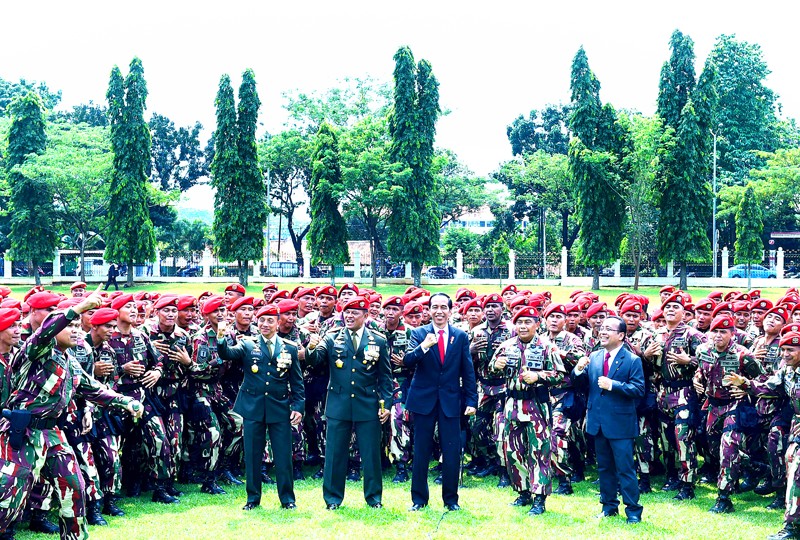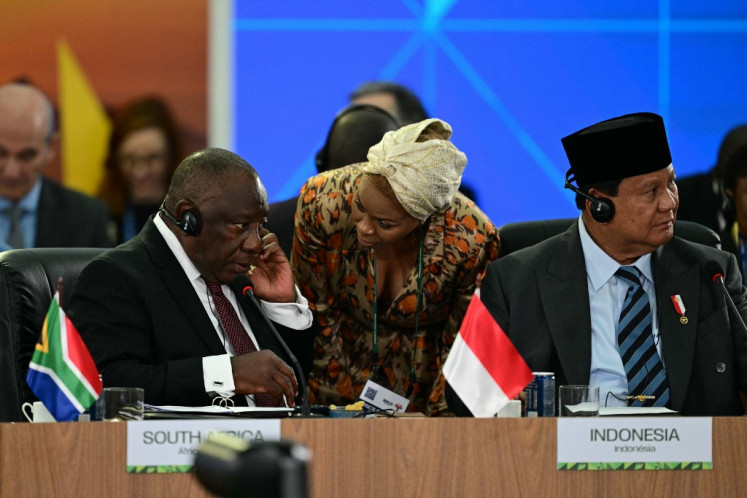Popular Reads
Top Results
Can't find what you're looking for?
View all search resultsPopular Reads
Top Results
Can't find what you're looking for?
View all search resultsProxy wars and their meaning for Indonesia
Do we have to seclude ourselves from the world or to become a daring and thinking nation that is forceful to globally compete and win in the harsh geopolitical competition? The following framework helps us to answer this question.
Change text size
Gift Premium Articles
to Anyone
 Show of strength: President Joko “Jokowi” Widodo (center) raises a clenched fist along with (from left to right) Army chief of staff Gen. Mulyono, Indonesian Military (TNI) chief Gen. Gatot Nurmantyo, Army Special Forces (Kopassus) chief Maj. Gen. Madsuni and State Secretary Pratikno during a visit to the Kopassus headquarters in Cijantung, Jakarta, on Thursday. Jokowi ordered Kopassus members to uphold national unity, respect diversity and protect all regardless of race, ethnicity and religion. (Presidential Office/Rusman)
Show of strength: President Joko “Jokowi” Widodo (center) raises a clenched fist along with (from left to right) Army chief of staff Gen. Mulyono, Indonesian Military (TNI) chief Gen. Gatot Nurmantyo, Army Special Forces (Kopassus) chief Maj. Gen. Madsuni and State Secretary Pratikno during a visit to the Kopassus headquarters in Cijantung, Jakarta, on Thursday. Jokowi ordered Kopassus members to uphold national unity, respect diversity and protect all regardless of race, ethnicity and religion. (Presidential Office/Rusman)
R
ecently, the Indonesian Military (TNI) commander, Gen. Gatot Nurmantyo, revealed his assessment of proxy warfare and its impacts on Indonesia. His assessment was perceived in varied ways.
The positive response views it as a strategic discourse launched to frame the existence of a common threat, thus unifying the nation and shaping and leveraging the nation’s alertness.
The neutral response views his assessment as a natural phenomenon in the globalized world where nations compete globally by using their hard, soft and smart power with or without the involvement of their government authorities.
The neutral response views it more openly and optimistically, by which they believe that the daring and thinking nations will automatically become superior and more influential over others.
On the other hand, the negative response views it skeptically, arguing that his assessment would only lead Indonesia to become a proxyphobic nation, thus justifying the overpowering employment of the military in civil society and in the exercise of the democratic way of life.
Regardless of which view one adheres to, it is much more important for us to contextually understand today’s proxy wars and their meaning for Indonesia: now and for the future.
Proxy warfare is by definition a form of conflict between two states or non-state actors in which neither one engages the other in a direct confrontational way.
While the proxy war could encompass a breadth of armed confrontation, its core definition is dependent upon a reality in which two separate powers are utilizing external strife to somehow attack the interests or territorial holdings of each other.
This frequently involves both countries fighting their opponent’s allies, or assisting their allies in fighting their opponent (the principle of our enemy’s enemy being our friend). Proxy warfare has long been viewed by a range of states, hegemonic powers and regional powers alike as an important tool of international policy.
A large involvement of military forces oftentimes increases the risk of destabilization and can lead to numerous unforeseen consequences.
The use of non-state actors or a third party can often serve to advance a country’s national security interests while avoiding the costs of overt military force.
A proxy war is, however, not without any risks. Despite these risks, proxy warfare will likely continue to be a constant fixture in international security affairs given the benefits it presents national policy makers.
Every person and every nation has their own political ontology and philosophy. The different political ontology will bear the different points of view through which a nation or someone perceives the reality of proxy wars. As an Indonesian, I view Nurmantyo’s assessment critically in the positive and neutral way seen from the global perspective and grounded in the perspective of what is the best for Indonesian national interests.
In the complex globalized world coupled with the advance of information technology, the logic of harsh geopolitical competition does not change: The daring and thinking nations will automatically be influential toward, domineering over and overpowering of other nations.
Therefore, the question is indeed how to become a winning nation in the harsh geopolitical competition. Do we have to seclude ourselves from the world or to become a daring and thinking nation that is forceful to globally compete and win in the harsh geopolitical competition? The following framework helps us to answer this question.
First, the government must make sure that the state ideology of Pancasila, the spirit of unity-in-diversity and the sense of love-of-the nation are effectively transformed as the nation’s strategic culture through which Indonesians unconsciously govern their minds and implement them accordingly in their daily, operational human affairs, including in the way Indonesians perceive and deal with threats to national interests.
In other words, the way a nation runs its daily life in peacetime and wages war in times of conflict are always the manifestation of its strategic culture.
Second, Indonesian students and government officials should be given wider access and opportunities to embrace global-class education since they are the nation’s future leaders who must be self-introspective and able to stand firmly and confidentially in the global marketplace in defending and advancing the interests of their nation.
How can future Indonesian leaders strategically outsmart other nations’ future leaders if they are not well equipped and well trained to read the foreigners’ minds and to use their knowledge for the maximum benefit of Indonesian national interests?
Third, the TNI along with the National Police and other national security institutions are to continue transforming their roles and capabilities to provide security and stability as necessitated by the conditions of the growing Indonesian democracy and economy.
Since 1998 until today, the TNI has gradually proven that its involvement in domestic affairs is still relatively in-line with the Indonesian judicial system, where the employment of the military is part of an overarching strategy to defend Indonesian citizens, national territory and wider national interests.
Fourth, the Indonesian political system must produce a strong, enlightened and smart civilized society that is able to compete globally and even to outsmart other nations. That is why both the political parties and the Indonesian government must have a strict standard to rigorously select future Indonesian leaders.
Such future leaders must pass an objective, rigorous and comprehensive security clearance test in order to assure their allegiance to Pancasila and Indonesian national interests, while at the same time having the capacity, exposures, influences, networks and confidence to compete globally.
It is indeed within the framework above that the implementation of a deliberative democracy — a democracy by the consensus of an enlightened society — can be sustained and Indonesia can eventually not only survive, but also come out as a winning nation in the harsh geopolitical reality where proxy warfare becomes a natural, prominent tool of one nation to influence, overpower and subdue other nations in the global landscape.
***
The writer is a Fulbright scholar and PhD candidate in the field of strategy and national security at the University of Exeter in the United Kingdom.
---------------
We are looking for information, opinions, and in-depth analysis from experts or scholars in a variety of fields. We choose articles based on facts or opinions about general news, as well as quality analysis and commentary about Indonesia or international events. Send your piece to community@jakpost.com. For more information click here.









